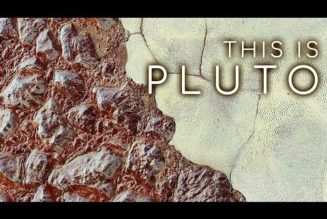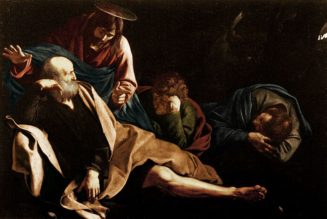, January 9, 2020
 The Christmas season is officially over this Sunday, the feast of the Baptism of the Lord (Year A). In our house, that means the decorations come down. The house goes from glistening with beauty and mystery to an ordinary-looking home again.
The Christmas season is officially over this Sunday, the feast of the Baptism of the Lord (Year A). In our house, that means the decorations come down. The house goes from glistening with beauty and mystery to an ordinary-looking home again.
The good news is that Christmas, with its the grace and wonder, won’t go away; it will just move deeper inside — down in the basement of the house, into the hearts of the family.
That is because if Christmas is about Jesus coming to the world, the Baptism of the Lord is about him coming to each of us.
The Baptism of the Lord Is a nice contrast with the Christmas season. Christmas is about light shining in darkness, with the darkness unable to overcome it. The Baptism is about Jesus in overwhelming light, and us unable to avoid it.
Christmas is a nighttime reality. Jesus arrives in a silent night and angels direct shepherds to him. Magi follow a star by night to find him. Joseph escapes with him by night for Egypt. The Baptism happens in the harsh light day at a desert river. Instead of seekers traveling to find the Baby Jesus, the adult Jesus joins the seekers where they are waiting. And instead of mere angels announcing who Jesus is, you get the Holy Spirit and the Father himself making the announcement.
This is what happens to each of us at baptism, when Jesus comes where we are, enters our life, and brings the whole Trinity with him.
Jesus did not need to be baptized — he did it for us. He wanted to demonstrate what we should do, and what we would become.
The priest prays in the collect on the feast of the Baptism: “Pray, that we may be inwardly transformed through him whom we recognize as outwardly like ourselves.” Or he prays on behalf of “your children by adoption, reborn of water and the Holy Spirit.”
Baptism makes us “a new creature,” an “adopted son of God,” a “partaker of the divine nature,” a ”member of Christ and co-heir with him,” “a temple of the Holy Spirit” and “the body of Christ.”
That means that, when Jesus emerge from the waters to a great theophany, we can see ourselves by his side. In Christ, we have the Holy Spirit hovering by us and the Father’s voice says “This is my beloved son, with whom I am well pleased.”
This gives us a powerful new personal identity, one we desperately need.
Our personal identity comes from our relationships. In America, we are too individualistic to fully appreciate that. We don’t want to be defined by others. But inevitably, we are.
Mary Eberstadt’s new book, Primal Scream, sees this need to find personal identity with others behind the prevalence of identity politics. Our family is naturally our tribe, but if we lack siblings, or a parent, or if we have moved away from them, we find substitute tribes — we identify with a party or cause, a specialized gender identity or sexual orientation, a sports team, or fiction genre, or passtime.
Too often a person won’t find a tribe of flesh and blood at all, and will identify as a loser or loner instead, or a criminal or an Internet troll. More often, the lonely lose their identity through consumerism and disappear in quiet despair.
But the Fest of the Baptism reveals our true identity, deeper even than family, because it is about our very origin. We are baptized into Jesus Christ, through whom all things were made. We are partners with the Holy Spirit, who renews the face of the earth. We are adopted by the Father from whom all fatherhood originates.
This is a mighty, dramatic reality in our life.
When Jesus talks about his baptism later in life, he says, “I came to cast fire upon the earth; and would that it were already kindled! have a baptism to be baptized with; and how I am constrained until it is accomplished!” (Luke 12:49-51)
Baptism for him is the entrance into a life of mighty deeds and cataclysmic confrontations. Sunday’s Psalm speaks of the voice he hears at his Baptism, the Father’s voice, as “mighty” and “majestic.” “The God of glory thunders,” it says, “and in his temple all say, ‘Glory!’”
Isaiah fills out the picture of who Jesus Christ is. He will be “a light for the nations, to open the eyes of the blind, to bring out prisoners from confinement, and from the dungeon, those who live in darkness.”
But notice what that drama means in reality: Jesus doesn’t offer material glory. He offers light and sight and freedom — in other words, truth, conscience and responsibility.
And this is how Christmas becomes an interior reality at Baptism.
In the second reading, from Acts, Peter speaks of Jesus’s baptism this way: “God anointed Jesus of Nazareth with the Holy Spirit and power. He went about doing good and healing all those oppressed by the devil, for God was with him.”
This is what the grand drama of the thundering voice of power leads to: Jesus “going about doing good.”
And this is what the mystery and excitement of Christmas should lead to in us when we transition to ordinary time. The grace of Christmas moves inside us, and powers the baptized life: A life lived in truth, with conscience and responsibility, a life of “going about doing good.”
Tags: Baptism of the Lord Year A, Sunday Gospel, Sunday Readings
Never miss a post! Subscribe below to our weekly newsletter.









